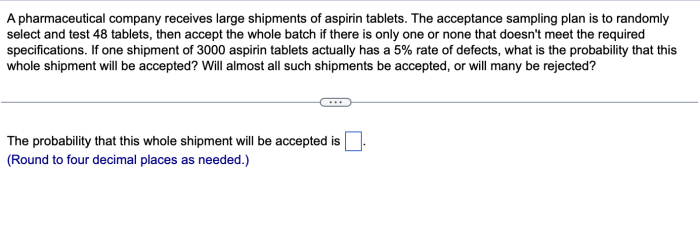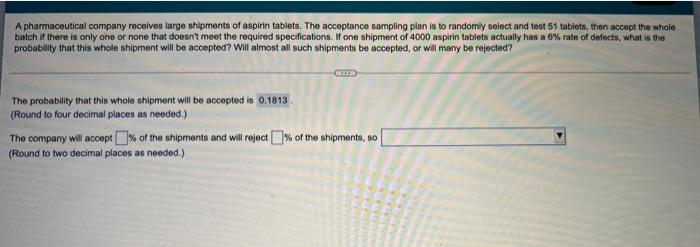A pharmaceutical company receives large shipments of aspirin tablets, embarking on a complex and multifaceted process that demands precision, adherence to regulatory standards, and a commitment to quality. From manufacturing and logistics to inventory management and distribution, each step plays a crucial role in ensuring the safe and effective delivery of this essential medication to patients.
The journey of aspirin tablets begins with a meticulous manufacturing process, where raw materials are transformed into tablets through a series of carefully controlled steps. Logistics and transportation pose unique challenges, requiring specialized packaging, labeling, and tracking systems to maintain product integrity during transit.
Inventory management systems optimize storage space, forecast demand, and ensure product availability.
Aspirin Manufacturing Process: A Pharmaceutical Company Receives Large Shipments Of Aspirin Tablets

Aspirin tablet manufacturing involves several key steps:
Raw Materials
- Acetylsalicylic acid (ASA): Active ingredient in aspirin
- Excipients: Substances added to enhance tablet stability, dissolution, and absorption (e.g., cellulose, starch)
Equipment
- Blenders: Mix raw materials uniformly
- Granulators: Convert powder into granules for better flow and compression
- Tablet presses: Compress granules into tablets
- Coating machines: Apply protective coatings to improve stability and taste
Quality Control
- In-process testing: Monitors raw materials, intermediates, and final products
- Batch release criteria: Ensures compliance with specifications before distribution
- Stability testing: Evaluates product stability over time
Logistics and Transportation

Large shipments of aspirin tablets are transported via various methods:
Transportation Methods
- Trucks: For short distances and local deliveries
- Trains: For long distances and bulk shipments
- Airplanes: For international shipments or time-sensitive deliveries
Packaging and Labeling, A pharmaceutical company receives large shipments of aspirin tablets
- Blister packs: Individual tablets sealed in aluminum foil
- Bottles: Plastic or glass containers with child-resistant caps
- Labels: Clearly display product information, dosage instructions, and warnings
Tracking Systems
- GPS tracking: Monitors vehicle location and temperature
- Electronic data loggers: Records temperature and humidity during transit
- Shipment tracking software: Provides real-time visibility of shipments
Challenges and Risks
- Temperature control: Aspirin is sensitive to heat and humidity
- Counterfeiting: Securing shipments against potential counterfeiting
- Regulatory compliance: Adhering to transportation regulations for pharmaceuticals
FAQ Explained
What are the key steps involved in the manufacturing process of aspirin tablets?
The manufacturing process of aspirin tablets involves several steps, including raw material preparation, blending, granulation, compression, coating, and packaging.
How are aspirin tablets transported and stored to maintain their quality?
Aspirin tablets are typically transported in temperature-controlled containers to prevent degradation. They are stored in dry, cool environments to maintain their stability and efficacy.
What quality assurance measures are in place to ensure the safety and efficacy of aspirin tablets?
Pharmaceutical companies implement rigorous quality assurance measures, including testing protocols, batch release criteria, and compliance with regulatory standards, to ensure the safety and efficacy of aspirin tablets.

